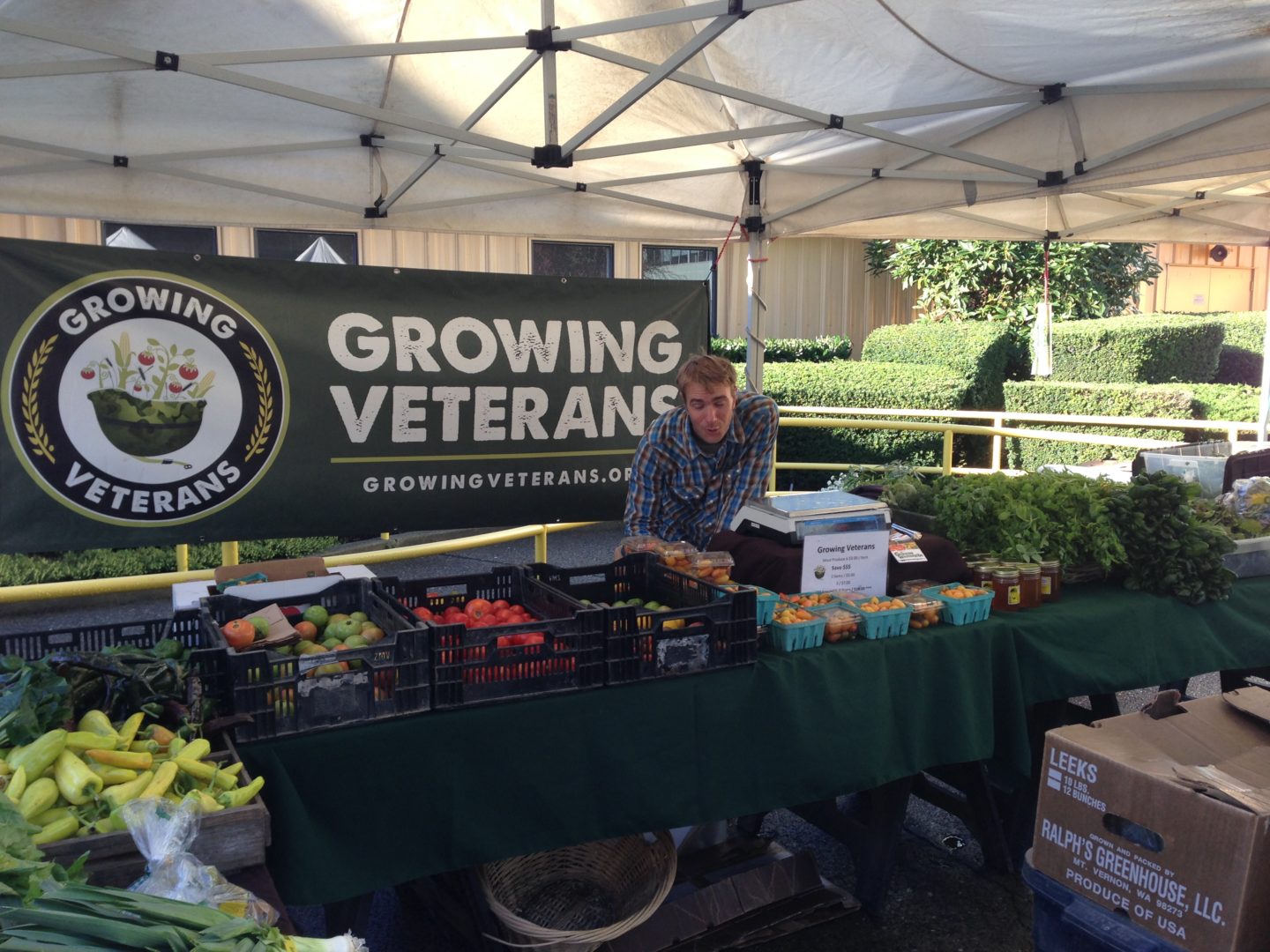Veterans Programs
 Overview
Overview
Federal programs are available to help farmer veterans...
- Purchase a farmhouse
- Access business education and develop the skills necessary to start and run a successful farm operation
- Get on-the-ground training with working farmers
- Gain priority entry into competitive farm conservation programs that provide financial benefits
- Obtain a business loan or grant
- Benefit from incentives for farmer landowners to sell to veterans
The goal of this page is to help direct farmer veterans (or veterans interested in becoming farmers) to the resources and programs that best fit their current needs.
Of particular note is the “Government Resources Guide for Farmer Veterans” (the “Guide”) produced by the Farmer Veteran Coalition and the Drake University Law School Agricultural Law Center. The Guide provides information about programs that directly support veterans whose goal is to start or improve a commercial agricultural business. Links to specific information within the Guide are provided below.
Veterans Programs
Below are brief descriptions of programs that veterans can use to start and run a farm business. Program descriptions include links to additional details and resources. The programs described below are run by various federal government agencies, including:
- United States Department of Veterans Affairs (VA)
- United States Department of Agriculture (USDA)
- Small Business Administration (SBA)
- United States Department of Labor (DOL)
Some state government agencies may also offer veteran-focused programs.
Keep in mind that programs run by different federal or state agencies can be used at the same time, and that it is often beneficial for a farmer veteran to combine a variety of programs. However, it is the farmer veteran’s job to figure out how to cobble together the different programs. Go to page 9 of the Guide to see how real-life farmer veterans have combined federal programs to create a successful farm operation. This page provides information about veteran-specific programs; see the Federal Conservation Programs page in this toolkit for additional farm program services.
Note that veterans programs, particularly those available through the VA and SBA, often address general veteran-related needs, such as healthcare, education, employment, and business concerns. These programs are not tailored to the specific needs of farmer veterans. Still, many programs aimed at veterans can be used to support one or more of the elements of a farm operation. For instance, through the VA Home Loan program, a veteran could purchase a house sitting on a piece of farmland. However, the VA Home Loan program could not be used to purchase the surrounding farmland. General veterans programs can also be used in combination with farm-focused USDA programs, which may offer a preference for veterans.
Use the descriptions below to identify which veterans programs might fit your needs. The “Government Resources Guide for Farmer Veterans” (the “Guide”) linked within the descriptions and the resources listed at the end of this page offer more details for farmer veterans, including how to apply and how to combine programs to meet your individual needs.
Purchase a farmhouse
- VA Home Loan. The primary purpose of this loan program is to help veterans secure a residence, meaning that this loan could help purchase a farmhouse, but can’t be used to purchase surrounding farmland or non-residential farm buildings. It is possible to combine the VA Home Loan program with a USDA farm loan in order to purchase both a farmhouse and surrounding farmland or buildings. It’s also possible to combine a VA Home Loan with a ground lease for the surrounding farmland and/or buildings. Go to page 22 of the Guide to learn more about VA Home Loans.
Access business education and develop the skills necessary to start and run a successful farm operation
- Veterans Business Outreach Centers (VBOC). VBOCs assist with any type of veteran-owned business, including farming. VBOC staff may or may not have specific experience with farming, but they can provide assistance with development of the key components necessary for any business. Go to page 32 of the Guide to learn more about VBOCs.
- VA Educational Benefits/GI Bill. GI Bill benefits can help pay for university degrees in agricultural fields (such as agronomy and sustainable agriculture), educational workshops on running your own business, and living expenses or other expenses associated with on-the-job training and approved apprenticeship programs (see below). Go to page 25 of the Guide to learn more about VA Educational Benefits and the GI Bill.
- Vocational Rehabilitation & Employment (VR&E). Rehabilitation Counselors can assist with business evaluation and planning and can connect farmer veterans with related resources. Some technology and skills provided by VR&E aimed at gaining personal independence may be relevant to on-farm work. Start with page 29 of the Guide to learn more about VR&E services.
Get on-the-ground training with working farmers
- Registered Apprenticeships. Veterans taking part in Registered Apprenticeships can receive GI Bill benefits during the apprenticeship. As the Guide explains, this means you can earn money from your employer while also receiving funding from the GI Bill. The amount received will depend on the GI Bill program used, although benefits through all programs decrease during the course of the apprenticeship as earnings increase. It’s important to note that although farming apprenticeships do exist, they are rare. Veterans seeking to use a Registered Apprenticeship to gain the knowledge and skills needed to run their own farm business may need to work with an existing farmer or organization to develop a Registered Apprenticeship program. Contact personnel at your State Department of Labor for assistance in this process.
- On-the-job training. GI Bill funding is available for on-the-job training outside of Registered Apprenticeships. While these types of opportunities may not be recognized by the Department of Labor, approval by a State Approving Agency is still required.
- Go to page 38 of the Guide to learn more about Registered Apprenticeships and on-the-job training.
Gain priority entry into competitive farm conservation programs that provide financial benefits
- Preference for veterans. The USDA sets aside a portion of funding for the Environmental Quality Incentives Program (EQIP) and a portion of the acres available for the Conservation Stewardship Program (CSP) for beginning and socially disadvantaged farmers and ranchers. Veterans who apply for EQIP or CSP funding and fall into at least one of these set-aside groups receive an additional preference in the form of “points” awarded to an application on top of any points granted to a beginning or socially disadvantaged farmer or rancher. Go to page 42 of the Guide to learn more about veteran preference in USDA conservation programs.
Obtain a business loan or grant
- SBA Veterans Advantage. This is an SBA program providing loans to small businesses that eliminates or reduces up-front fees on guaranteed loans for veterans. These loans can be used for any type of business, including farm businesses. Go to page 35 of the Guide to learn more about Veterans Advantage.
- Value-Added Producer Grants (VAPG). The VAPG program allows farmers to receive grants directly for private farm businesses, and it includes a preference for veterans. The program helps agricultural producers enter into value-added activities related to the processing and/or marketing of new products. For example, Prairie Pride Poultry, a veteran-owned farm in Nebraska, received a Value-Added Producer Grant to support the marketing of locally produced eggs. Go to page 42 of the Guide to learn more about Value-Added Producer Grants.
- Microloan assistance. USDA microloan assistance is available through the USDA Farm Service Agency (FSA). Compared to traditional FSA farm loans, microloan assistance has a more streamlined application process and USDA requires less farm management experience for microloan applicants. Although veterans do not receive a preference in the microloan application process, veterans are eligible for more favorable loan terms, including capped interest rates and longer loan terms. Go to page 43 of the Guide to learn more about microloan assistance.
Benefit from incentives for farmer landowners to sell to veterans
- Land transition incentives. The Conservation Reserve Program (CRP) Transition Incentive Program gives owners of land coming out of CRP additional CRP payments if they lease or sell the land to a farmer veteran. This program only applies if: (1) the landowner is retired or retiring from farming; and (2) the owner agrees to sell the property to the farmer veteran or to enter a long-term lease (5 years or more) that gives the farmer veteran an option to purchase the land. Go to page 41 of the Guide to learn more about land transition incentives.
Farmer Spotlight:
Growing Veterans

Civilian volunteers and veterans work alongside each other to grow organic produce to sell at a Seattle hospital farmer’s market. Growing Veterans aims to empower veterans through sustainable agriculture.
 How An Attorney Can Help
How An Attorney Can Help
The Attorney’s Role
It’s not an attorney’s job to make decisions for farmers or to set farm transfer goals. Instead, attorneys can provide information about pros and cons of different options, advice about what is common versus unusual, fair versus unfair, etc. Attorneys can help farmers understand the universe of possible farm transfer goals and help narrow down individual options so that farmers can make final decisions.
How An Attorney Can Help With Veterans Programs
- Understand how the rules of the federal programs apply to you.
- Apply to a federal program that helps veterans or gives priority to veterans.
- Appeal a decision of a federal agency.
- Form and plan a farm business.
Related Legal Tools



The Center for Agriculture and Food Systems is an initiative of Vermont Law School, and this toolkit provides general legal information for educational purposes only. It is not meant to substitute, and should not be relied upon, for legal advice. Each farmer’s circumstances are unique, state laws vary, and the information contained herein is specific to the time of publication. Accordingly, for legal advice, please consult an attorney licensed in your state.
 Additional Resources
Additional Resources